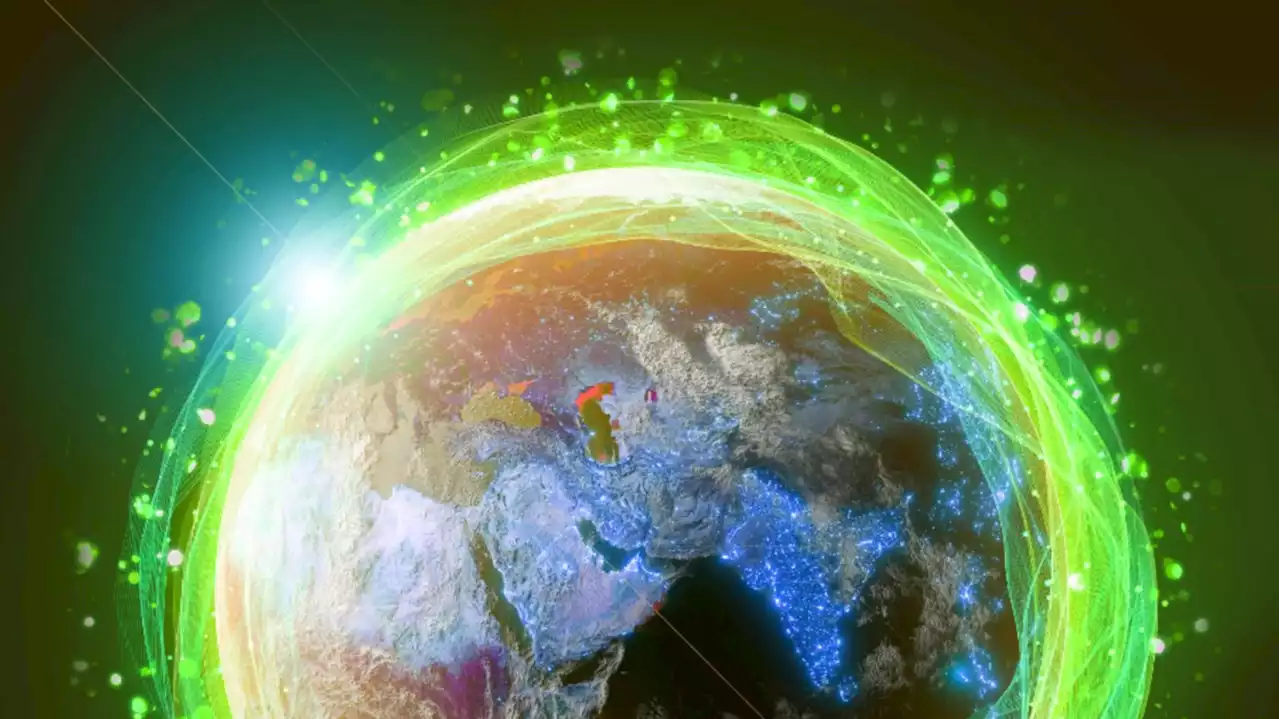The World Set Free, by H. G. Wells, is part of the HackerNoon Books Series. - humanity weapons
Chap. 1 THE NEW SOURCE OF ENERGYThe problem which was already being mooted by such scientific men as Ramsay, Rutherford, and Soddy, in the very beginning of the twentieth century, the problem of inducing radio-activity in the heavier elements and so tapping the internal energy of atoms, was solved by a wonderful combination of induction, intuition, and luck by Holsten so soon as the year 1933.
Young Holsten’s face was white. He walked with that uneasy affectation of ease that marks an overstrained nervous system and an under-exercised body. He hesitated at the White Stone Pond whether to go to the left of it or the right, and again at the fork of the roads. He kept shifting his stick in his hand, and every now and then he would get in the way of people on the footpath or be jostled by them because of the uncertainty of his movements.
He went into those little gardens beneath the over-hanging, brightly-lit masses of the Savoy Hotel and the Hotel Cecil. He sat down on a seat and became aware of the talk of the two people next to him. It was the talk of a young couple evidently on the eve of marriage. The man was congratulating himself on having regular employment at last; ‘they like me,’ he said, ‘and I like the job. If I work up—in’r dozen years or so I ought to be gettin’ somethin’ pretty comfortable.
His intelligence struggled against this mood and struggled for a time in vain. He reassured himself against the invasion of this disconcerting idea that he was something strange and inhuman, a loose wanderer from the flock returning with evil gifts from his sustained unnatural excursions amidst the darknesses and phosphorescences beneath the fair surfaces of life.
‘It has begun,’ he writes in the diary in which these things are recorded. ‘It is not for me to reach out to consequences I cannot foresee. I am a part, not a whole; I am a little instrument in the armoury of Change. If I were to burn all these papers, before a score of years had passed, some other man would be doing this. . .
There is a story of a demented London stockbroker running out into Threadneedle Street and tearing off his clothes as he ran. ‘The Steel Trust is scrapping the whole of its plant,’ he shouted. ‘The State Railways are going to scrap all their engines. Everything’s going to be scrapped—everything. Come and scrap the mint, you fellows, come and scrap the mint!’
There in a stuffy court in London, a grimy oblong box of a room, during the exceptional heat of the May of 1956, the leading counsel of the day argued and shouted over a miserable little matter of more royalties or less and whether the Dass-Tata company might not bar the Holsten-Roberts’ methods of utilising the new power. The Dass-Tata people were indeed making a strenuous attempt to secure a world monopoly in atomic engineering.
‘We want to know has the plaintiff added anything to this or hasn’t he?’ said the judge, ‘we don’t want to have your views whether Sir Philip Dass’s improvements were merely superficial adaptations or whether they were implicit in your paper. No doubt—after the manner of inventors—you think most things that were ever likely to be discovered are implicit in your papers. No doubt also you think too that most subsequent additions and modifications are merely superficial.
And he was, he tells us, a ‘Modern State’ man ‘by instinct’ from the beginning. He breathed in these ideas in the class rooms and laboratories of the Carnegie Foundation school that rose, a long and delicately beautiful facade, along the South Bank of the Thames opposite the ancient dignity of Somerset House. Such thought was interwoven with the very fabric of that pioneer school in the educational renascence in England.
‘For three days in succession we turned out before dawn and—for no earthly reason—without breakfast,’ he relates. ‘I suppose that is to show us that when the Day comes the first thing will be to get us thoroughly uncomfortable and rotten. We then proceeded to Kriegspiel, according to the mysterious ideas of those in authority over us.
Indeed, in his book, he thanks fortune for them. ‘I might have lived and died,’ he says, ‘in that neat fool’s paradise of secure lavishness above there. I might never have realised the gathering wrath and sorrow of the ousted and exasperated masses. In the days of my own prosperity things had seemed to me to be very well arranged.
Barnet made his way along this night-scene rather apprehensively since the police had power to challenge and demand the Labour Card of any indigent-looking person, and if the record failed to show he was in employment, dismiss him to the traffic pavement below. He asked a passing stroller, and was told that the men had struck that day against the use of an atomic riveter that would have doubled the individual efficiency and halved the number of steel workers.
They were not singing, they were not even talking, there was nothing truculent nor aggressive in their bearing, they had no definite objective they were just marching and showing themselves in the more prosperous parts of London. They were a sample of that great mass of unskilled cheap labour which the now still cheaper mechanical powers had superseded for evermore. They were being ‘scrapped’—as horses had been ‘scrapped.
‘I saw life plain,’ he wrote. ‘I saw the gigantic task before us, and the very splendour of its intricate and immeasurable difficulty filled me with exaltation.
It was a gift that, in spite of the precedent of De Quincey, might under the repressive social legislation of those times, have brought Barnet within reach of the prison lash. But he took it, he confesses, and thanked her as well as he was able, and went off very gladly to get food.A day or so later—and again his freedom to go as he pleased upon the roads may be taken as a mark of increasing social disorganisation and police embarrassment—he wandered out into the open country.
United States Latest News, United States Headlines
Similar News:You can also read news stories similar to this one that we have collected from other news sources.
 The New Phase | HackerNoonThe World Set Free, by H. G. Wells, is part of the HackerNoon Books Series. - disasters weapons
The New Phase | HackerNoonThe World Set Free, by H. G. Wells, is part of the HackerNoon Books Series. - disasters weapons
Read more »
 The Last Days of Marcus Karenin | HackerNoonThe World Set Free, by H. G. Wells, is part of the HackerNoon Books Series. - humanity civilization
The Last Days of Marcus Karenin | HackerNoonThe World Set Free, by H. G. Wells, is part of the HackerNoon Books Series. - humanity civilization
Read more »
 Adventures in the Ghost World | HackerNoonAstounding Stories of Super-Science April 1931, by Astounding Stories is part of HackerNoon’s Book Blog Post series. You can jump to any chapter in this book here. VOL. VI, No. 1 - The Ghost World - hackernoonbooks projectgutenberg
Adventures in the Ghost World | HackerNoonAstounding Stories of Super-Science April 1931, by Astounding Stories is part of HackerNoon’s Book Blog Post series. You can jump to any chapter in this book here. VOL. VI, No. 1 - The Ghost World - hackernoonbooks projectgutenberg
Read more »
 THE SEA RAIDERS | HackerNoonAnd then, slowly uncoiling their tentacles, they all began moving towards him—creeping at first deliberately, and making a soft purring sound to each other. - sciencefiction fantasy
THE SEA RAIDERS | HackerNoonAnd then, slowly uncoiling their tentacles, they all began moving towards him—creeping at first deliberately, and making a soft purring sound to each other. - sciencefiction fantasy
Read more »
 Blockchain and Metaverse Games Are Bringing Well-needed Innovation to the Gaming Sector | HackerNoonA look at the impact of blockchain technology on the gaming industry - enterthemetaverse blockchain
Blockchain and Metaverse Games Are Bringing Well-needed Innovation to the Gaming Sector | HackerNoonA look at the impact of blockchain technology on the gaming industry - enterthemetaverse blockchain
Read more »
